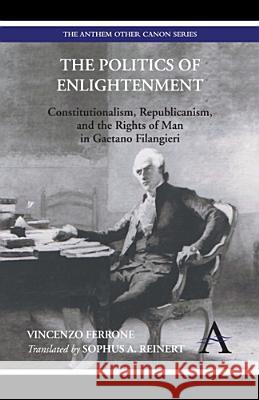The Politics of Enlightenment: Constitutionalism, Republicanism, and the Rights of Man in Gaetano Filangieri » książka
The Politics of Enlightenment: Constitutionalism, Republicanism, and the Rights of Man in Gaetano Filangieri
ISBN-13: 9781783083121 / Angielski / Miękka / 2014 / 310 str.
The Politics of Enlightenment: Constitutionalism, Republicanism, and the Rights of Man in Gaetano Filangieri
ISBN-13: 9781783083121 / Angielski / Miękka / 2014 / 310 str.
(netto: 122,00 VAT: 5%)
Najniższa cena z 30 dni: 127,05
ok. 30 dni roboczych.
Darmowa dostawa!
Written by one of Italy's leading historians, this book analyses the context and legacy of Gaetano Filangieri's seven-volume Science of Legislation. The study engages with the unique history of Enlightenment Naples, the intellectual traditions upon which Filangieri drew, and the powerful repercussions of the American Revolution in eighteenth-century Italy to re-draw the map of Enlightenment republicanism and the early history of human rights and their political economy. Particularly, the book elucidates Montesquieu's polyvalent influence on the development of Enlightenment political philosophy, the intricate relationship between natural law and natural rights (later human rights), the emergence of an idiom and a theory of constitutionalism as the only safeguard against absolutist abuses and democratic excesses (whether due to communitarian zeal or the influence of charismatic leaders), and the importance of Freemasonry as a school of political theory and a locus of political action and re-action at the time. This brings the book to a lengthy discussion of the tensions between liberalism and poverty as well as patriotism and cosmopolitanism in the Italian republican tradition - themes all too relevant in today's historiographical landscape - and Filangieri's eventual contribution to these debates and to the institutionalization of the rights of man as a political category and an influence on political economy in Enlightenment Europe. The second part of the book deals with Filangieri's legacy, engaging both with his immediate acolytes, such as Francesco Mario Pagano, drafter of the Neapolitan constitution of 1799, and his detractors, such as the conservative Vincenzo Cuoco. The book ends with groundbreaking chapters on Filangieri's reception in France and in Europe at large, focusing on Benjamin Constant's little-understood critique of Filangieri and the tensions between the constitutional republicanism of the late Italian Enlightenment on the one hand and the nascent tradition of liberalism on the other. In doing so, this book not only explains the common roots of these two traditions, but also why they diverged and what consequences this had for Italian and European history.











